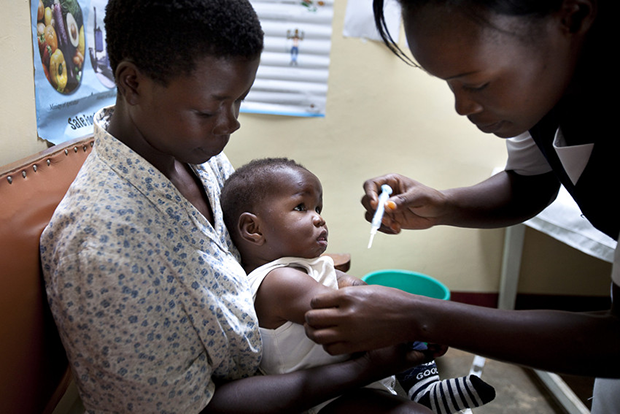Where We Work
See our interactive map


One of the greatest successes in global health in the past 25 years has been the slashing of childhood mortality rates around the world driven by increased access to vaccines delivered by frontline health workers.
Cheap, safe, and effective vaccines like the polio vaccine have saved millions of lives and brought us to the brink of eradicating a deadly disease.
It can be easy to forget the crucial role frontline health workers play in delivering life-saving vaccines, especially in conflict zones, where attacks on health workers have become one of the largest barriers to polio eradication. Frontline health workers take great personal risk to make sure every last child is vaccinated, as well as travel to rural, underserved areas where health systems have not adequately reached.
In 2014, more people died from attacks on health workers than from polio itself.
Each year, for example, over 2.5 million health workers fan out across India to make sure that each and every child is vaccinated against polio. These campaigns serve as an opening to deliver more than just polio vaccines—investments in India’s polio campaigns have strengthened its health system’s ability to deliver a variety of essential vaccines and health services.
As a direct result, India has gone nearly four years without any new cases of polio and received certification from the World Health Organization as “polio-free.”
Far too often, however, the frontline health workers are risking their own lives and safety to save lives in their communities by delivering vaccines. Just last month, a suicide bomber in Pakistan killed 15 people just outside of a polio eradication center.
These attacks reflect a growing trend of violence targeting health workers—in 2014, more people died from attacks on health workers than from polio itself.
In order to effectively deliver the full range of essential health services, health workers must be present, ready, connected, and safe, a mantra the organization I work for, IntraHealth International, lives by in our efforts to strengthen the frontline health workforce worldwide. As IntraHealth and other leaders of the Frontline Health Workers Coalition frequently point out in our advocacy efforts, each of these issues when not properly addressed undermines the effectiveness of our investments in health workers.
Based on our success in reducing childhood mortality through vaccines, it’s clear that frontline health workers count.
Fifty-six percent of people living in rural areas worldwide do not have access to essential health services, more than double the rate in urban areas, a disparity explained largely by disparities in health workers. Simultaneously, health workers that do reach rural areas are often underpaid, under-trained, or otherwise work in poor conditions.
Based on our success in reducing childhood mortality through vaccines, it’s clear that frontline health workers count. Scaling up most interventions in global health, particularly in rural and hard to reach areas, will require that we focus on the needs of health workers. Ensuring that frontline health workers are safe, motivated, properly trained, and incentivized must be central considerations of strategies to scale up and sustain access to vaccines.
This post originally appeared on Gavi's Vaccineswork.org. Photo by Trevor Snapp for IntraHealth International.
Get the latest updates from the blog and eNews




